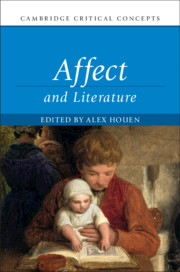Book contents
- Affect and Literature
- Cambridge Critical Concepts
- Affect and Literature
- Copyright page
- Contents
- Notes on Contributors
- Introduction
- I Origins
- II Developments
- Chapter 11 Feeling Feelings in Early Modern England
- Chapter 12 Laughable Poetry
- Chapter 13 Modernism, Formal Innovation, and Affect in some Contemporary Irish Novels
- Chapter 14 The Antihumanist Tone
- Chapter 15 Bette Davis’s Eyes and Minoritarian Survival: Camp, Melodrama, and Spectatorship
- Chapter 16 Affective Form
- Chapter 17 Subaltern Affects
- III Applications
- Index
Chapter 15 - Bette Davis’s Eyes and Minoritarian Survival: Camp, Melodrama, and Spectatorship
from II - Developments
Published online by Cambridge University Press: 16 January 2020
- Affect and Literature
- Cambridge Critical Concepts
- Affect and Literature
- Copyright page
- Contents
- Notes on Contributors
- Introduction
- I Origins
- II Developments
- Chapter 11 Feeling Feelings in Early Modern England
- Chapter 12 Laughable Poetry
- Chapter 13 Modernism, Formal Innovation, and Affect in some Contemporary Irish Novels
- Chapter 14 The Antihumanist Tone
- Chapter 15 Bette Davis’s Eyes and Minoritarian Survival: Camp, Melodrama, and Spectatorship
- Chapter 16 Affective Form
- Chapter 17 Subaltern Affects
- III Applications
- Index
Summary
On screen Bette Davis captivates James Baldwin. Baldwin is unsure what to make of her, except that he recognizes a kinship between the two of them and he is not alone in finding himself in Bette Davis’ eyes. What to make of this fascination with Davis? This essay parses the affective currents that flow between Davis, Baldwin, and the playwright Adrienne Kennedy, using the frameworks of camp and melodrama. Both affective genres build identification through excess and exaggeration – camp hyperbolizes style while melodrama amplifies feeling. These queer forms attach to Davis in different ways, revealing identificatory strategies for coping with the unhappiness of minoritarian subjectivity while simultaneously revealing the vacuum that lies at the heart of this excess.
- Type
- Chapter
- Information
- Affect and Literature , pp. 284 - 299Publisher: Cambridge University PressPrint publication year: 2020
- 1
- Cited by

